

Experimental Humanities Lab. Institute for Oral History. National Park Service History. OHMS: Oral History Metadata Synchronizer. Born in Slavery: Slave Narratives from the Federal Writers' Project, 1936-1938. The Library of Congress Manuscript Division, Library of Congress and Prints and Photographs Division, Library of Congress Search by Keywords | Browse Narratives by Narrator | VolumeBrowse Photographs by Subject | Browse All by State Born in Slavery: Slave Narratives from the Federal Writers' Project, 1936-1938 contains more than 2,300 first-person accounts of slavery and 500 black-and-white photographs of former slaves.
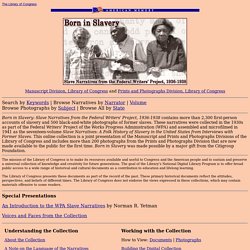
These narratives were collected in the 1930s as part of the Federal Writers' Project of the Works Progress Administration (WPA) and assembled and microfilmed in 1941 as the seventeen-volume Slave Narratives: A Folk History of Slavery in the United States from Interviews with Former Slaves. This online collection is a joint presentation of the Manuscript and Prints and Photographs Divisions of the Library of Congress and includes more than 200 photographs from the Prints and Photographs Division that are now made available to the public for the first time.
Welcome to The University of the West Indies at Cave Hill, Barbados. Research not requiring IRB Review. Classroom research Most research conducted for classroom assignments does not meet the definition of human subjects research.
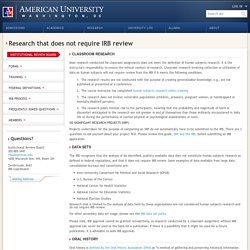
It is the instructor's responsibility to ensure the ethical conduct of research. Classroom research involving collection or utilization of data on human subjects will not require review from the IRB if it meets the following conditions. SIS Significant Research Projects (SRP) Projects undertaken for the purpose of completing an SRP do not automatically have to be submitted to the IRB. Data sets The IRB recognizes that the analysis of de-identified, publicly available data does not constitute human subjects research as defined in federal regulations, and that it does not require IRB review. Inter-University Consortium for Political and Social Research (ICPSR)U.S. For other secondary data set usage, please see the IRB data set policy.
Oral History, Human Subjects, and Institutional Review Boards. Oral History, Human Subjects, and Institutional Review Boards Linda Shopes Since at least the mid-1990s, college and university students, faculty, and staff who conduct oral history interviews have increasingly found their interviewing protocols subject to review by their local Institutional Review Board (commonly referred to as an IRB), a body charged by the federal government with protecting the rights, interests, and dignity of human research subjects – or, as some prefer, research participants.
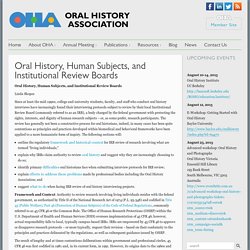
The review has generally not been a constructive process for oral historians, indeed, in many cases has been quite contentious as principles and practices developed within biomedical and behavioral frameworks have been applied to a more humanistic form of inquiry. The following sections will: Introduction to Oral History. Oral History Centre. OHS Ethics. Who is this guidance for?
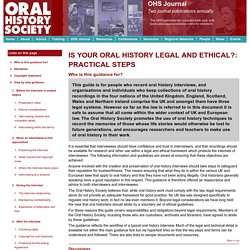
This guide is for people who record oral history interviews, and organisations and individuals who keep collections of oral history recordings in the four nations of the United Kingdom. England, Scotland, Wales and Northern Ireland comprise the UK and amongst them have three legal systems. However so far as the law is referred to in this document it is safe to assume that all come within the wider context of UK and European law.
The Oral History Society promotes the use of oral history techniques to record the memories of those whose life stories would otherwise be lost to future generations, and encourages researchers and teachers to make use of oral history in their work. It is essential that interviewees should have confidence and trust in interviewers, and that recordings should be available for research and other use within a legal and ethical framework which protects the interests of interviewees. ^Back to top Disclaimer Copyright statement Preparatory steps. Oral History - Articles - Making History. Oral history as public history Public history even in recent years has been somewhat neglected in Britain, certainly in comparison to Australia and the United States.
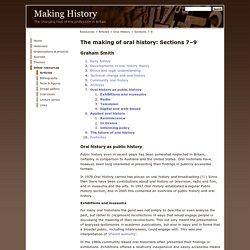
Oral historians have, however, been long interested in presenting their findings in publicly accessible formats. International Oral History Association. Oral history methodology. Oral History - Articles - Making History. HISTORIA ORAL EN LA PAGINA DEL PROFE TOMÁS AUSTIN. La historia oral es al mismo tiempo las más nueva y la más vieja forma de historia.
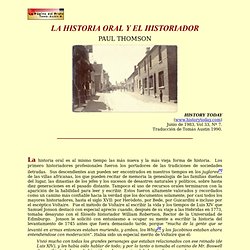
Los primero historiadores profesionales fueron los portadores de las tradiciones de sociedades iletradas. Sus descendientes aun pueden ser encontrados en nuestros tiempos en los juglares de las villas africanas, los que pueden recitar de memoria la genealogía de las familias dueñas del lugar, las dinastías de los jefes y los sucesos de desastres naturales y políticos, sobre hasta diez generaciones en el pasado distante. Tampoco el uso de recursos orales terminaron con la aparición de la habilidad para leer y escribir. Estos fueron altamente valorados y recordados como un camino más confiable hacia la verdad que los documentos solamente, por casi todos los mayores historiadores, hasta el siglo XVII: por Heródoto, por Bede, por Guicardini e incluso por el escéptico Voltaire.